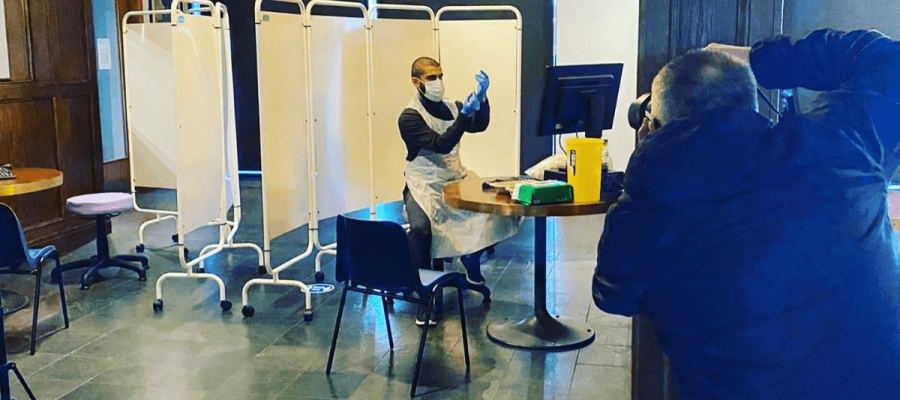Clinical community pharmacists; the way forward?
In late November I was invited by the University of Manchester Pharmacy Society (MUPS) to deliver a talk to mixed years pharmacy undergraduates about my career as a pharmacist. I began by speaking about my pre-reg year and then moved onto the different roles I’ve undertaken in my career, before finally relaying where I am at this present day.
My overall message to the students advocated becoming an all-around skilled pharmacist who is capable of entering a number of new sectors. I stressed to the students that I genuinely now believe what is meant by that oft-heard cliché, “pharmacy is changing”.
In my journey in pharmacy, I have undertaken roles in many different sectors, including hospital, private mental health wards, community pharmacy, general practice, at a dementia care unit and as a clinical services development manager for a community pharmacy management company.
I have never liked being pigeonholed as only one type of pharmacist. I am a pharmacist who loves to partake in all the sectors. The most significant time I have spent in one role has been as a community pharmacy branch manager, and it was here that I felt the most frustrated and restrained. It might seem controversial, but I support community pharmacy supervision regulations being amended and more responsibilities falling on pharmacy technicians. I believe clinical checks on prescriptions can either be conducted centrally from the prescribing surgery, remotely by a pharmacist elsewhere or done less frequently, e.g. checked once in every six months providing there have been no changes to the patient or the medication. The technology to enable this to be completed safely already exists. Accuracy checking technicians already exist, and they could easily take the role of a final physical accuracy checker in community pharmacy.
I also agree with pharmacy contract changes to a service led model with the caveat of equal opportunity for services and fair remuneration. I believe pharmacy students have not paid to undertake a four-year undergraduate programme of study to be merely limited to clinically and accuracy checking prescriptions in community pharmacy. Community pharmacists have always aspired to use their knowledge of disease conditions and therapeutics, but somewhere after completing their preregistration qualification, something changes. I believe the existing Community Pharmacy Contractual Framework (CPCF) should take the bulk of the blame. It’s inhibited pharmacist development in community pharmacies. Community pharmacy should be a predominantly patient facing role.

Can things change?
Although the existing model for community pharmacy is predominantly geared towards renumerating dispensing with a few “advanced” services like MURs, NMS etc. With revenue from dispensing continuing to fall with no signs of this abating, many big chains and medium-size multiples have started to explore other additional revenue streams to stay in the black. This has forced many companies to look into delivering innovative services outside of the normal pharmacy contract. It has meant some companies have had to shift from what could have been perceived as an insular model of operating to now a more multidisciplinary and collaborative approach. There is a part of me who feels it’s a shame that it takes a squeeze to force a change in attitude, but, on the other hand, can you really blame community pharmacy contractors for concentrating on driving prescription item numbers up when this is what the pharmacy contract has always rewarded?
For a few years now, I have stated that I believe community pharmacy has the most significant potential in the NHS to create change in the healthcare system. Community pharmacies and pharmacists are abundant in number and have the potential to improve patient outcomes significantly if they are awarded the opportunity for services which benefit their patients. We are well aware that there are massive shortages of GPs and nurses in the UK. We know that the recent NHS funded pilot for pharmacists in general practice has been a success and many GP surgeries around the UK are now attempting to offset the challenges of recruiting GPs with pharmacists of varying competencies to undertake some different roles in their practices. A different skills mix with the most appropriate clinician for the most appropriate task or service.
Similar recruitment issues are arising in secondary care. There has been a great deal of talk about alleviating pressures from secondary care by better management of patients in primary care while simultaneously diversifying and increasing the responsibility of patient outcomes in primary care. Some have called this a “shift to the left”, and it can only be delivered with a more significant role of pharmacists in community pharmacies. Community is also a part of this shift.
The same pharmacist that undertakes advanced roles in general practice can deliver the same, similar or even a more advanced role, if afforded the opportunity in community pharmacy. There should be no significant skills or competency differences between the two. A pharmacist in general practice should be no more “clinical” than those in the community. We should refrain from using such differentiating labels which contribute to lowered perceptions of pharmacists working in the community for example, a pharmacist in general practice being called a “clinical pharmacist”. Would we ever call a pharmacist working in community pharmacy a “Clinical Community Pharmacist? Pharmacists should be trained to use their skills across many settings.
The NHS recognise this, and it’s precisely the reason why we’ve already started to see split PreRegistration positions between General Practice and Community Pharmacy being funded by Health Education England to commence in the summer of 2019. One of the companies I work with, Imaan Healthcare have already been doing this for over a year with some of their trainees splitting their time across community pharmacy, general practice, specialist dementia care units and mental health hospitals.
Pharmacists in community pharmacy can deliver more advanced roles in the prevention of long term conditions. They can play a more hands-on role in managing and optimising long term conditions. They can help alleviate the pressures on acute condition management in general practice with clinical pathways which means they are first triaged in community pharmacy. There is nothing stopping pharmacists going further in diagnosing and managing both acute and long term conditions with extra training, robust pathways and the right clinical governance in place. There are many ways digital platforms like NHS 111, the directory of services etc, can use community pharmacy.
Both local and national commissioners have to start a conversation about how to utilise pharmacists in the community better. They must begin trusting community pharmacists with more advanced services which are funded and renumerated fairly. Now is the time to be brave and innovative. It’s great talking about working together in clusters on a neighbourhood level, but community pharmacists must be a part of this group. With greater access to patient records where first steps have started with access to summary care records (SCR), collaborative pathways and improved services which are accessible to patients, the healthcare outcomes of populations will only improve. This is the result we all want. Let’s start including community pharmacy in the NHS transformation plans.

Ghulam Haydar is a Services Development Manager for GreenLife Pharma, a General Practice PreRegistration coordinator for Imaan Healthcare, a Dementia Care pharmacist and General Practice pharmacist for GP Care Services.
You can follow Ghulam Here:




Thanks for sharing information.